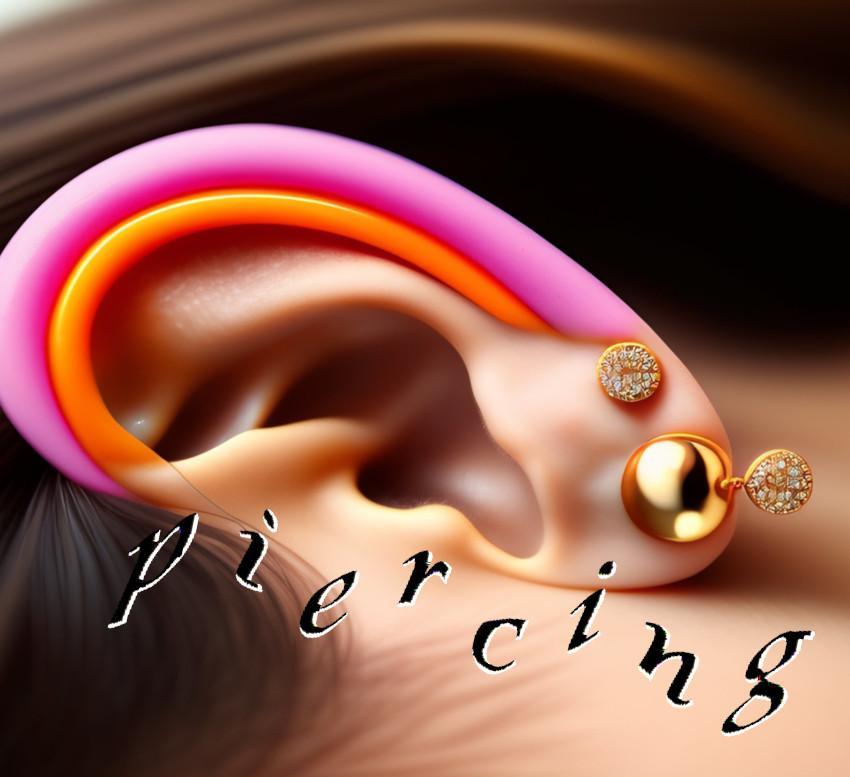


Body piercing is a timeless form of self-expression and adornment, with a rich history spanning cultures and centuries. Whether it's a delicate earlobe piercing or a bold septum ring, piercings are a unique way to showcase individual style. In this comprehensive guide, we'll explore the world of piercing and the services provided by professional piercers, offering insights and useful tips for those considering this form of body modification.
The Art of Piercing:
Body piercing is more than a fashion statement; it's a form of body art that holds cultural, spiritual, and personal significance. From traditional ear piercings to avant-garde placements, piercings allow individuals to express their identity and creativity.
Choosing a Professional Piercer:
Selecting a reputable and experienced piercer is crucial for a safe and enjoyable piercing experience. Research piercers in your area read reviews, and consider recommendations. Look for studios that prioritize hygiene, use quality jewelry, and employ skilled professionals.
Hygiene and Safety:
Hygiene is paramount in the piercing process to prevent infections and complications. Professional piercers adhere to strict cleanliness standards, using sterilized equipment and disposable needles. Ensure that the piercing studio follows industry best practices for a safe experience.
Types of Piercings:
Piercings come in a myriad of styles and locations. Common ear piercings include lobes, cartilage, and helix piercings. Facial piercings can range from nostril and septum piercings to lip and eyebrow piercings. Research different types of piercings to find the style that resonates with your aesthetic.
Personal Consultation:
Before getting pierced, schedule a personal consultation with the piercer. Discuss your desired piercing, placement options, and any concerns you may have. A consultation allows you to build rapport with the piercer and ensures that you are well-informed before making a decision.
Choosing the Right Jewelry:
The type of jewelry you choose is a crucial aspect of the piercing process. High-quality materials like titanium, surgical stainless steel, and gold are recommended for their hypoallergenic properties. Discuss jewelry options with your piercer to find the best fit for your style and body.
Aftercare:
Proper aftercare is essential for a successful healing process. Your piercer will provide detailed aftercare instructions, including cleaning routines and potential signs of infection. Follow these guidelines diligently to promote healing and reduce the risk of complications.
Healing Time and Patience:
Each piercing has a unique healing time, ranging from a few weeks to several months. Patience is key during this period. Avoid touching the piercing unnecessarily, refrain from changing jewelry prematurely, and follow aftercare instructions to ensure a smooth healing process.
Piercing Studios vs. DIY:
Professional piercing studios provide a controlled and sterile environment, reducing the risk of infections and complications. Avoid DIY piercing kits, as they lack the expertise, hygiene standards, and safety measures of a professional studio. Opting for professional services ensures a safer and more enjoyable experience.
Piercing Trends and Personal Style:
Explore current piercing trends and consider how they align with your style. From curated ear stacks to unique facial piercings, the possibilities are vast. Engage in open communication with your piercer to create a customized look that complements your aesthetic preferences.
Piercing Maintenance and Upkeep:
Once your piercing has healed, regular maintenance ensures the longevity of the piercing and prevents complications. Check the jewelry periodically for tightness, cleanliness, and signs of wear. Visit your piercer for professional check-ups and adjustments as needed.
Consulting with Healthcare Professionals:
If you have pre-existing medical conditions or concerns about getting pierced, consult with healthcare professionals before making a decision. Certain medical conditions or medications may impact the suitability of certain piercings, and it's essential to prioritize your health and well-being.
A piercing services business is a type of business that provides professional piercing services to customers. This can include ear piercing, body piercing, and other types of piercing. Here are some details about what a piercing services business might offer:
Types of piercing services: A piercing services business may offer a wide range of piercing services, including ear piercing, nose piercing, lip piercing, eyebrow piercing, tongue piercing, nipple piercing, and genital piercing.
Piercing equipment and supplies: A piercing services business will need to invest in high-quality piercing equipment and supplies, including piercing guns, needles, sterilization equipment, jewelry, and aftercare products.
Professional piercers: A piercing services business will need to employ or contract professional piercers who are trained and experienced in piercing techniques and safety protocols.
Clean and sterile environment: A piercing services business must maintain a clean and sterile environment to prevent infection and ensure the safety of its customers. This includes regular sterilization of equipment and surfaces, as well as the use of disposable items when possible.
Customer education and aftercare: A piercing services business should provide customers with information on the risks and benefits of piercing, as well as aftercare instructions to ensure proper healing and minimize the risk of infection or other complications.
Marketing and promotion: A piercing services business will need to market and promote its services to attract customers. This may include advertising online or in local publications, attending events or fairs, and offering special promotions or discounts.
Legal and regulatory requirements: A piercing services business must comply with all relevant legal and regulatory requirements, including obtaining any necessary permits or licenses, complying with health and safety regulations, and following industry best practices.
(!) A successful piercing services business will provide high-quality, professional piercing services in a safe and clean environment, while also educating customers on proper aftercare and complying with all legal and regulatory requirements.
There are many types of piercings that a piercing services business may offer. Here are some of the most common types of piercings, along with details about each one:
Ear piercings: Ear piercings are the most common type of piercing and include standard lobe piercings, cartilage piercings, and helix piercings. These piercings are typically done with a piercing gun or a sterile needle, and a wide range of jewelry styles and materials are available.
Nose piercings: Nose piercings are also very popular and include nostril piercings, septum piercings, and bridge piercings. These piercings are typically done with a sterile needle and a range of jewelry styles and materials are available.
Lip piercings: Lip piercings include labret piercings, which are done below the center of the lower lip, and Monroe piercings, which are done above the upper lip on the side of the face. These piercings are typically done with a sterile needle, and a range of jewelry styles and materials are available.
Eyebrow piercings: Eyebrow piercings are typically done above the eyebrow, and a range of jewelry styles and materials are available. These piercings are typically done with a sterile needle.
Tongue piercings: Tongue piercings are done through the center of the tongue, and a range of jewelry styles and materials are available. These piercings are typically done with a sterile needle.
Nipple piercings: Nipple piercings are done through the center of the nipple, and a range of jewelry styles and materials are available. These piercings are typically done with a sterile needle.
Genital piercings: Genital piercings include a wide range of piercings done on the genital area, including Prince Albert piercings, which are done on the underside of the penis, and clitoral hood piercings, which are done on the clitoral hood. These piercings are typically done with a sterile needle, and a range of jewelry styles and materials are available.
Before starting a career as a piercer or performing piercings on yourself or others, it's important to have a thorough understanding of the following:
Anatomy: You need to have a good understanding of the anatomy of the body part being pierced, including the placement and structure of bones, muscles, nerves, and blood vessels. This knowledge is critical in avoiding injury or damage to these structures during the piercing process.
Health and safety: You need to be familiar with proper health and safety protocols, including infection control, sterilization, and hygiene. This includes knowledge of the proper use of autoclaves, sterilization of equipment, and the use of disposable items.
Piercing techniques: You need to be familiar with various piercing techniques and the equipment used, such as needles, clamps, and forceps. It's important to be able to perform piercings with precision and accuracy to minimize the risk of complications.
Jewelry selection and placement: You need to have a good understanding of jewelry selection and placement, including the different types of materials and styles available, as well as proper placement to optimize healing and minimize complications.
Aftercare: You need to be able to provide clear and detailed aftercare instructions to clients, including proper cleaning techniques and what to expect during the healing process.
Licensing and regulations: It's important to research and comply with local and national regulations and licensing requirements for piercers in your area.
Body piercing is a captivating form of self-expression, and professional piercers provide the expertise and guidance needed for a safe and enjoyable experience. By choosing a reputable piercer, prioritizing hygiene and safety, and following proper aftercare, individuals can embark on a journey of self-discovery through this ancient and artistic practice. Remember, a well-executed piercing is not just a decoration; it's a testament to individuality and the enduring artistry of self-expression.
Warm regards,

We use cookies
We use cookies and other tracking technologies to improve your browsing experience on our website, to show you personalized content and targeted ads, to analyze our website traffic, and to understand where our visitors are coming from. Privacy Policy.